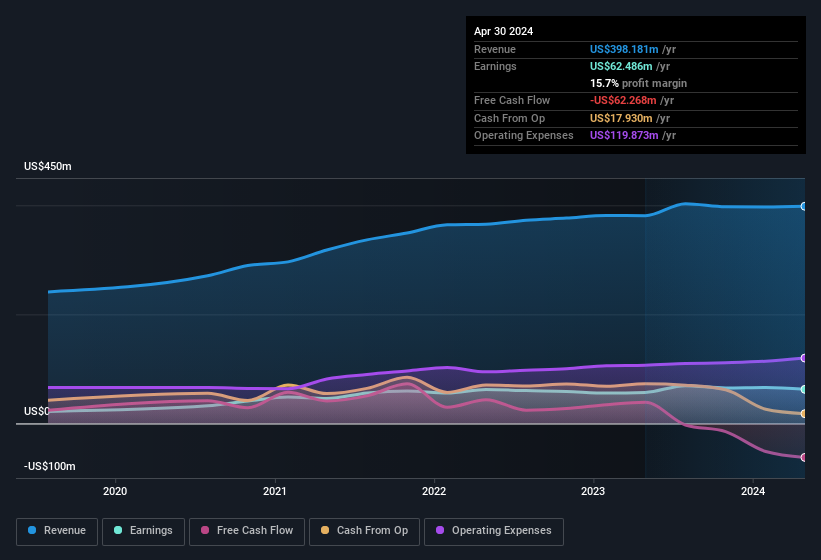- United States
- /
- Beverage
- /
- NYSE:NAPA
Solid Earnings May Not Tell The Whole Story For Duckhorn Portfolio (NYSE:NAPA)

The Duckhorn Portfolio, Inc.'s (NYSE:NAPA ) stock didn't jump after it announced some healthy earnings. We think that investors might be worried about some concerning underlying factors.
See our latest analysis for Duckhorn Portfolio

One essential aspect of assessing earnings quality is to look at how much a company is diluting shareholders. In fact, Duckhorn Portfolio increased the number of shares on issue by 28% over the last twelve months by issuing new shares. As a result, its net income is now split between a greater number of shares. To celebrate net income while ignoring dilution is like rejoicing because you have a single slice of a larger pizza, but ignoring the fact that the pizza is now cut into many more slices. Check out Duckhorn Portfolio's historical EPS growth by clicking on this link.
A Look At The Impact Of Duckhorn Portfolio's Dilution On Its Earnings Per Share (EPS)
Duckhorn Portfolio has improved its profit over the last three years, with an annualized gain of 36% in that time. But EPS was only up 22% per year, in the exact same period. And in the last year the company managed to bump profit up by 9.7%. But in comparison, EPS only increased by 9.5% over the same period. And so, you can see quite clearly that dilution is having a rather significant impact on shareholders.
Changes in the share price do tend to reflect changes in earnings per share, in the long run. So Duckhorn Portfolio shareholders will want to see that EPS figure continue to increase. However, if its profit increases while its earnings per share stay flat (or even fall) then shareholders might not see much benefit. For the ordinary retail shareholder, EPS is a great measure to check your hypothetical "share" of the company's profit.
That might leave you wondering what analysts are forecasting in terms of future profitability. Luckily, you can click here to see an interactive graph depicting future profitability, based on their estimates.
Our Take On Duckhorn Portfolio's Profit Performance
Duckhorn Portfolio shareholders should keep in mind how many new shares it is issuing, because, dilution clearly has the power to severely impact shareholder returns. Because of this, we think that it may be that Duckhorn Portfolio's statutory profits are better than its underlying earnings power. Nonetheless, it's still worth noting that its earnings per share have grown at 22% over the last three years. Of course, we've only just scratched the surface when it comes to analysing its earnings; one could also consider margins, forecast growth, and return on investment, among other factors. If you'd like to know more about Duckhorn Portfolio as a business, it's important to be aware of any risks it's facing. For example - Duckhorn Portfolio has 2 warning signs we think you should be aware of.
This note has only looked at a single factor that sheds light on the nature of Duckhorn Portfolio's profit. But there is always more to discover if you are capable of focussing your mind on minutiae. For example, many people consider a high return on equity as an indication of favorable business economics, while others like to 'follow the money' and search out stocks that insiders are buying. So you may wish to see this free collection of companies boasting high return on equity, or this list of stocks with high insider ownership.
If you're looking to trade Duckhorn Portfolio, open an account with the lowest-cost platform trusted by professionals, Interactive Brokers.
With clients in over 200 countries and territories, and access to 160 markets, IBKR lets you trade stocks, options, futures, forex, bonds and funds from a single integrated account.
Enjoy no hidden fees, no account minimums, and FX conversion rates as low as 0.03%, far better than what most brokers offer.
Sponsored ContentNew: Manage All Your Stock Portfolios in One Place
We've created the ultimate portfolio companion for stock investors, and it's free.
• Connect an unlimited number of Portfolios and see your total in one currency
• Be alerted to new Warning Signs or Risks via email or mobile
• Track the Fair Value of your stocks
Have feedback on this article? Concerned about the content? Get in touch with us directly. Alternatively, email editorial-team (at) simplywallst.com.
This article by Simply Wall St is general in nature. We provide commentary based on historical data and analyst forecasts only using an unbiased methodology and our articles are not intended to be financial advice. It does not constitute a recommendation to buy or sell any stock, and does not take account of your objectives, or your financial situation. We aim to bring you long-term focused analysis driven by fundamental data. Note that our analysis may not factor in the latest price-sensitive company announcements or qualitative material. Simply Wall St has no position in any stocks mentioned.
About NYSE:NAPA
Excellent balance sheet and fair value.
Similar Companies
Market Insights
Community Narratives



